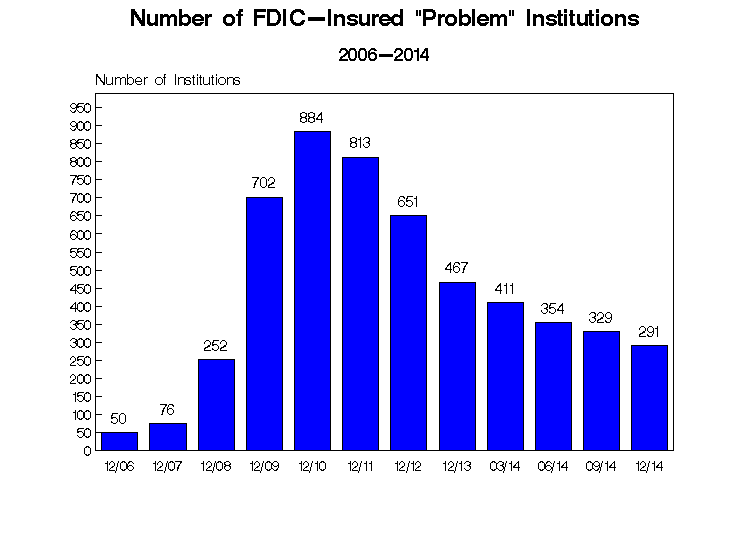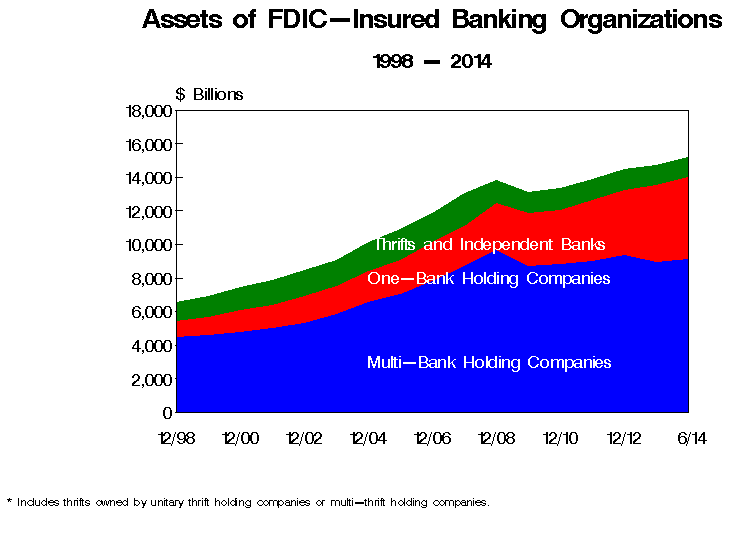In 2007 it would have been inconceivable for anyone to imagine that savers would receive virtually zero percent return on their money. The entire concept of wealth creation is built not only upon savings but upon the magic of compound interest whereby your money works for you by earning more money. It wasn’t that long […]
Yes – It Is Still Possible to Get High Interest Rates on Your Savings
Number of Problem Banks Declines for 15th Consecutive Quarter
According to the latest FDIC Quarterly Banking Profile the number of problem banks continued to decline for the quarter ending December 31, 2014. After reaching a peak of 888 at the end of the first quarter of 2011 the number of problem banks has declined for 15 consecutive quarters. The number of problem banks is […]
Banks Have Just Lost Their Biggest Profit Center – What Will Replace Billions of Profits from Loan-Loss Releases?
During the past five years bankers have reaped billions of dollars in profits by simply making accounting entries instead of making loans. What was the biggest source of banking industry profit growth over the past five years? As noted repeatedly in FDIC Quarterly Banking Profile reports, the biggest contribution to earnings growth has come from […]
Over 8,500 Banks Have Disappeared Since 1990 – “Too Big to Fail” Remains a Banking Reality
The latest FDIC Quarterly Banking Profile highlights the sharp decline in the number of banks over the past 24 years. For the quarter ending September 30, 2014 the number of FDIC insured institutions totaled 6,589 down by 56 percent from a total of 15,158 in 1990. Since December 1998 the number of banks has dropped […]
What Is the Average Rate on a Bank Credit Card?
Credit cards have become an absolute necessity for most people despite the high rates charged on revolving loan balances. Whether traveling anywhere in the world or just buying a cup of coffee at Starbucks, a credit card allows the purchaser a safe, convenient, and fast method of paying for a purchase. The use of both […]
Bank Failures Fall to Seven Year Low
During the financial crisis the number of banking failures swelled to a peak failure year during 2010 when a total of 157 banking institutions failed. The number of bank failures has declined every year since then and the number of banks failures during 2014 has reached a seven year low. Is the current low number […]
Would Bank Living Wills/Resolution Plans Actually Help Resolve the Next Banking Crisis?
The public portions of the annual resolution plans or living wills of 17 large financial institutions were jointly released by the FDIC and the Federal Reserve Board today. The resolution plans describe in detail a financial institution’s plans for a rapid and orderly resolution under the U.S. Bankruptcy Code to address material financial distress or […]
FDIC Reveals That Over 400 Banks Remain on the Problem Bank List
The recently released Quarterly Banking Profile from the FDIC reveals that over 400 banks remain on the Problem Bank List more than six years after the start of the biggest banking crisis since the 1930s. As of March 31, 2014, the FDIC’s confidential Problem Bank List contains the names of 411 banking institutions that have […]
Columbia Savings Bank, Ohio, Eighth Bank Failure of 2014 – Hundreds of Zombie Banks Remain Open for Business
State regulators shuttered a small Ohio bank which became the eighth banking failure of the year. The Ohio Division of Financial Institutions closed Columbia Savings Bank, Cincinnati, Ohio, and appointed the FDIC as receiver. To protect depositors the FDIC sold the failed bank to United Fidelity Bank, fsb, Evansville, Indiana, which assumed all deposits. Although […]
Housing Recovery Stalls as Old Rules for Recover No Longer Apply
The old rules for a strong housing market appear to have changed in a fundamental manner frustrating traditional analysts who have been predicting a housing recovery. In the latest Economic and Housing Market Outlook report, Freddie Mac examines three fundamental areas in the housing market that have not behaved as expected which has contributed to […]









